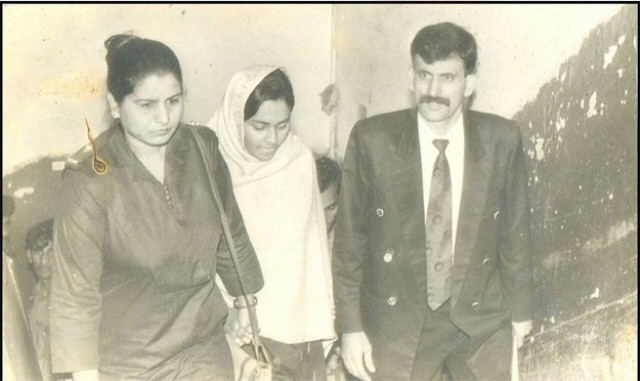After 20 years: Asma Nawab, two others acquitted by Supreme Court
She was accused of murdering her parents and brother

Asma Nawab with her lawyer at City Courts in Karachi in 1998. PHOTO: COURTESY JAVED AHMED CHHATARI
The acquittal due to insufficient evidence brought tears and a smile to the face of 33-year-old Asma Nawab and others. However, who committed the infamous triple murder is, once again, a mystery.
The apex court's three member bench, headed by Justice Asif Saeed Khosa, heard appeals filed by Asma, Javed Ahmed Siddiqui and Muhammad Farhan, at the SC's Karachi Registry. The bench, which also comprised Justice Mushir Alam and Justice Mazhar Alam Khan Miankhel, ordered the prison authorities to immediately release the suspects if their custody was not required in any other case.
An anti-terrorism court (ATC) had awarded death sentence to Nawab after finding her guilty of killing her parents and brother on December 30, 1998 - when she was just 16 years old, according to her lawyer, Javed Ahmed Chhatari. The other appellants, Siddiqui and Farhan, were also given death sentences for helping her. A co-accused, Muhammad Waseem, was, however, sentenced to 10 years by the ATC.
Accountability court: Modarba scam accused gets seven-year sentence
The suspects were accused of murdering Asma's father Nawab Ahmed, mother Abrar Begum and brother Asif Nawab. According to the prosecution, Asma committed the murders because her parents were opposing her marriage with Farhan.
The convicts challenged their conviction and sentences in the Sindh High Court (SHC) in 1999 but a two-judge anti-terrorism appellate bench of the SHC delivered a split judgment on the appeals on January 28, 2009.
The bench's senior member, Justice Ali Sain Dino Maitlo acquitted the appellants due to a lack of evidence by the prosecution but Justice Dr Rana M Shamim upheld the conviction and sentences awarded by the trial court.
Justice Anwar Zaheer Jamali, who was then SHC chief justice, referred the case to Justice Abdul Rasool Memon on January 30, 2009, to decide it as a referee judge.
Nearly six years later, Justice Memon heard the appeals afresh and upheld the ruling handed down by the ATC.
The SC ruled on Tuesday that there was no evidence available on record to directly link the appellants with the commission of the alleged offence of triple murder. The bench observed that the material evidence produced by the prosecution had contradictions and did not corroborate with the prosecution's story.
The apex court also noticed that the prosecution had also failed to establish a direct connection of the weapons, which according to the police were used in the triple murder, with the accused persons.
In its ruling, the judges pointed out that fingerprints of Farhan were obtained two days after his arrest and that too in the absence of a judicial magistrate.
Justice Khosa remarked that the police investigated accused through its own methods and later failed to establish their case in the court. Due to lack of evidence, accused persons were acquitted and courts were blamed for their acquittals, he added.



















COMMENTS
Comments are moderated and generally will be posted if they are on-topic and not abusive.
For more information, please see our Comments FAQ